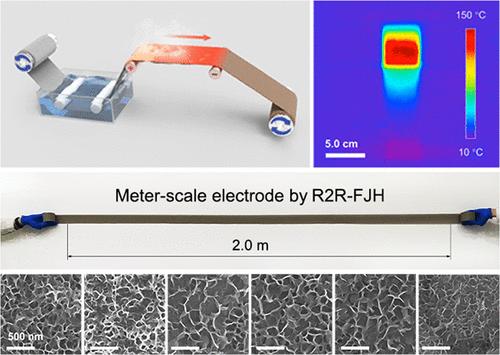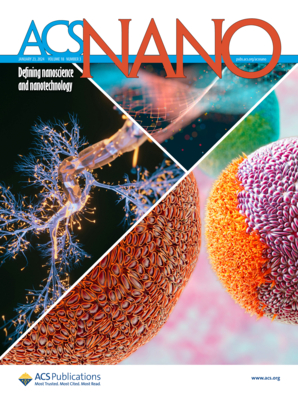Roll-to-Roll Flash Joule Heating to Stabilize Electrocatalysts onto Meter-Scale Ni Foam for Advanced Water Splitting
IF 16
1区 材料科学
Q1 CHEMISTRY, MULTIDISCIPLINARY
引用次数: 0
Abstract
The seamless integration of electrocatalysts onto the electrode is crucial for enhancing water electrolyzers, yet it is especially challenging when scaled up to large manufacturing. Despite thorough investigation, there are few reports that tackle this integration through roll-to-roll (R2R) methodology, a technique crucial for fulfilling industrial-scale demands. Here, we develop an R2R flash Joule heating (R2R-FJH) system to process catalytic electrodes with superior performance. The electrodes exhibited improved stability and activity, showcasing an exceptional performance within an alkaline water electrolysis (AWE) system. They achieved a low operation potential of 1.66 V at 0.5 A cm–2, coupled with outstanding durability over the operation of 800 h. We further demonstrated a prototype of a rolled-up water splitting apparatus, illustrating the efficiency of R2R-FJH electrodes in producing high-purity hydrogen through advanced water oxidation. Our study emphasized the practicality and scalability of the R2R-FJH strategy in the industrial manufacturing of high-performance electrodes for water electrolysis.

卷对卷闪蒸焦耳加热稳定米级镍泡沫上的电催化剂用于高级水分解
电催化剂与电极的无缝集成对于提高水电解槽的性能至关重要,但当规模扩大到大型制造时,这尤其具有挑战性。尽管进行了彻底的调查,但很少有报告通过卷对卷(R2R)方法解决这种集成问题,这是满足工业规模需求的关键技术。在这里,我们开发了一种R2R闪光焦耳加热(R2R- fjh)系统来加工具有优异性能的催化电极。电极表现出更好的稳定性和活性,在碱性电解(AWE)系统中表现出优异的性能。他们在0.5 a cm-2下实现了1.66 V的低工作电位,并且在800小时的工作时间内具有出色的耐久性。我们进一步展示了一个卷式水分解装置的原型,说明了R2R-FJH电极通过高级水氧化产生高纯度氢气的效率。我们的研究强调了R2R-FJH策略在高性能水电解电极工业制造中的实用性和可扩展性。
本文章由计算机程序翻译,如有差异,请以英文原文为准。
求助全文
约1分钟内获得全文
求助全文
来源期刊

ACS Nano
工程技术-材料科学:综合
CiteScore
26.00
自引率
4.10%
发文量
1627
审稿时长
1.7 months
期刊介绍:
ACS Nano, published monthly, serves as an international forum for comprehensive articles on nanoscience and nanotechnology research at the intersections of chemistry, biology, materials science, physics, and engineering. The journal fosters communication among scientists in these communities, facilitating collaboration, new research opportunities, and advancements through discoveries. ACS Nano covers synthesis, assembly, characterization, theory, and simulation of nanostructures, nanobiotechnology, nanofabrication, methods and tools for nanoscience and nanotechnology, and self- and directed-assembly. Alongside original research articles, it offers thorough reviews, perspectives on cutting-edge research, and discussions envisioning the future of nanoscience and nanotechnology.
文献相关原料
公司名称
产品信息
阿拉丁
Nickel chloride hexahydrate
阿拉丁
ferric chloride hexahydrate
阿拉丁
chloroplatinic acid
阿拉丁
absolute ethanol
 求助内容:
求助内容: 应助结果提醒方式:
应助结果提醒方式:


